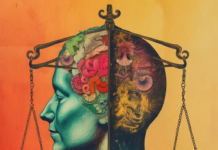In an upcoming book chapter published in The Routledge international handbook of discrimination, prejudice, and stereotyping, David J Harper and Kian Vakili examine the scope of discrimination related to psychiatric diagnoses and the lived experience of people diagnosed with schizophrenia. They recommend a move beyond “stigma” models due to their tendency to focus on the victim of discrimination towards a model informed by epistemic justice and a focus on those that engage in discriminatory behavior.
To counter the prejudice and discrimination associated with psychiatric diagnoses and the dominance of the biomedical model of mental illness, the authors recommend the “power, threat, meaning framework” (PTMF) and trauma-informed approaches as possible alternative conceptualizations of psychological suffering and abnormal behavior.
“New developments like Trauma-Informed approaches and the PTMF offer alternative ways of understanding mental health and prejudice and discrimination. It seems clear that there is a need for a wholesale change of direction in the way in which the problem of mental health prejudice and discrimination is conceptualized and addressed,” Harper and Vakili write.
“This will require a collective movement for change, including psychiatric survivor activists and their allies, researchers, policymakers, and legislators. The international public conversation about mental health needs rebalancing in order to highlight the limitations of a biomedical approach, the benefits of alternative approaches and to emphasize that ideas of mental health are contested cultural constructs.”
 Previous research has linked the biomedical model of mental health to stigma and discrimination. While anti-stigma campaigns focusing on biomedical explanations of psychological suffering and abnormal behavior have been linked to increased stigma, those focusing on psychosocial explanations have been linked to reduced stigma. Anti-stigma campaigns may also hinder withdrawal from psychotropic medication.
Previous research has linked the biomedical model of mental health to stigma and discrimination. While anti-stigma campaigns focusing on biomedical explanations of psychological suffering and abnormal behavior have been linked to increased stigma, those focusing on psychosocial explanations have been linked to reduced stigma. Anti-stigma campaigns may also hinder withdrawal from psychotropic medication.
Researchers have explained how psychiatric diagnoses can lead to epistemic injustice, a situation in which people around you take your statements less seriously than they should. Unfortunately, this is a phenomenon that can often occur in clinical settings. One example of this is the divide between how clinicians and service users tend to understand the causes of psychological suffering, with clinicians favoring biomedical explanations and service users favoring psychosocial ones.
Service users have detailed how epistemic injustice can cause doctors to discriminate against people with psychiatric diagnoses. In addition to discrimination from doctor’s in clinical settings, research has shown how artificial intelligence could be used in mental health discrimination, including “advisors to the Trump Administration reportedly promoting experimentation to determine ‘whether technology, including phones and smartwatches, can be used to detect when mentally ill people are about to turn violent.’” Psychiatric diagnoses can also lead to discrimination in professional settings, such as policies that keep people with mental health diagnoses from being lawyers in Louisiana.
The current work begins by acknowledging that euro-centric ideas of mental health, as represented in this work and the works they are citing, are not universal. They explain that mental health and illness concepts vary wildly across cultures, and as such, the applicability of this work may be limited to the cultures in which it was created.
The chapter then explores the scope of the problem of discrimination around mental health. The authors point to previous research indicating that 91% of people with mental health diagnoses have experienced discrimination in some form.
Additionally, research has reported that 40% of people with mental health diagnoses experienced harassment in their communities compared to just 15% of the general population. The authors explain that people with psychiatric diagnoses are also much more likely to be the victims of crime. Research has shown that they are nearly 3 times as likely to be victims of a non-violent crime and more than 6 times as likely to be victims of violent assault.
Harper and Vakili point to the increased influence of the biomedical model of mental health driving this discrimination. They present research indicating that while campaigns about psychiatric diagnoses have successfully promoted the biomedical model of mental health, they have not changed attitudes in terms of stigma and discrimination towards people with mental health diagnoses. The authors also point to media depictions of mental illness and biomedical explanations as driving factors in discrimination.
The current work points to models of stigma as problematic as well. These models take the focus away from issues of power, justice, and systematic failures and turn it towards the victims of discrimination. Rather than focusing on stigma, the authors suggest a shift to epistemic injustice.
By examining how prejudice causes us to disregard people’s statements, we can better understand how systematic issues are at the heart of psychological suffering. Ultimately, they argue that we should be attending to the discrimination rather than the stigma of mental illness.
The chapter presents the lived experience of several people diagnosed with schizophrenia, focusing on navigating the discrimination that results from these diagnoses. Participants had two main strategies for dealing with discrimination.
First, many reported struggling to keep their diagnoses from becoming common knowledge among their peers. These participants reported having to manage symptoms and side effects from medications to avoid detection.
Second, they attempted to establish identities distanced from their diagnosis. Some participants achieved this sense of identity by emphasizing the commonalities between themselves and those without psychiatric diagnoses, sometimes avoiding others with similar diagnoses. Others achieved a sense of identity by embracing what made them different from those without diagnoses.
Harper and Vakili point towards conceptualizations of mental illness that emphasize psychosocial rather than biomedical explanations as to the first step in combating prejudice and discrimination in mental health.
The PTMF understands psychological suffering and abnormal behavior as an adaptable reaction to environmental circumstances. For example, paranoid tendencies that may be diagnosed as schizophrenia in a biomedical model could be explained as a reaction to the constant threats of poverty and discrimination in the PTMF.
Similarly, trauma-informed approaches emphasize the role of trauma rather than brains and chemical imbalances in psychological suffering.
****
Harper, D., Vakili, K. Mental Health Prejudice, Discrimination, and epistemic justice: Moving Beyond Stigma and Biomedical Dominance. In M. Augoustinos, K. Durrheim & C. Tileaga (eds), Routledge international handbook of discrimination, prejudice, and stereotyping. London: Routledge. (Link)















—Experiences of Prejudice and Discrimination in Mental Healthcare
Experiences of prejudice and discrimination in mental healthcare are common.
Report comment